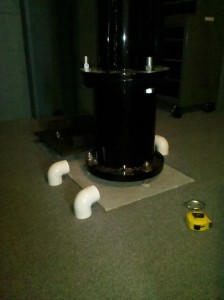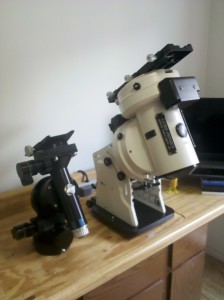I am taking advantage of the holiday season, the full moon and the weather forecast to stand down the PTO. I will be accomplishing several upgrades that I have been sitting on for some time now.
During my initial observatory planning I neglected to include the dome base ring in the pier height calculation. That left it 12″ shorter than I was wanting. The pier I have is made by ATS (Advanced Telescope Systems). I contacted them and had them make an 18 inch tall “spacer”. Placing it under the existing pier has raised the mount 6″ higher than I originally planned but it is still be below the level of the dome slot. The tree line surrounding the observatory prevents observing any closer to the horizon.
The second update is to replace my mount. Currently, I use a Losmandy G-11. It has proven to be an excellent mount, even though I long ago exceeded the stated load capacity (60 lbs). Two years ago I purchased a 12.5″ Cave Astrola Newtonian telescope at an estate sale. There is no way the G-11 would be able to swing that size of telescope. So, after evaluating several mounts in the load range I wanted, I purchased an Astro-Physics 1600. The AP 1600’s instrument capacity (220 lbs) should handle any future scope that the observatory can handle (or that I can afford).
I only want to change one major component at a time, so for now, I will change only the mount and will continue to use the 10″ scope. Only after the mount is fully operational and characterized will I upgrade the scope.
Even though I had to get my oldest son to help with the weight of the mount, physically installing it and the spacer was the easy part. The real effort will be updating the operating environment.
- First and foremost, will be balancing the scope with all the support equipment (camera, guide scope, etc.). The increased load capacity of the 1600 makes it much less sensitive to balance than the G-11 but still needs to be done to optimize the mount’s tracking accuracy.
- Next will be polar aligning the new mount. The Losmandy was fairly well aligned to the Earth’s axis of rotation. It wasn’t perfect but the small misalignment was easily handled by the guider. The 1600’s altitude adjustment mechanism appears to be easier to adjust than the G-11 which will make it easier to get an improved alignment.
- The new mount, of course, has a different control system. That means changing to a new software driver and establishing new calibration parameters. It also means an extensive testing period to make sure all the different software packages play well with the new mount.
- The new mount comes with software support to characterize the periodic error inherent in all geared systems. AP mounts are known for their very small periodic error, but the software tool will be run and the resultant model incorporated into the overall system to improve the tracking.
- Since the mount is positioned higher in the dome and is physically larger, I will need to change the parameters used in the dome driver to ensure the slot is positioned directly in front of the telescope.
- I will have to see how much the tree line now blocks my view of the sky. The planetarium software I use (TheSkyX) allows a local conditions overlay to portray the visible portion of the sky. My guess is the vertical displacement will not change the view enough to worry about, but I don’t want to find out later that it did.
The last update this go around will be to the floor in the dome room. One of my best ideas was to install a raised floor there. The floor is sectioned into 7 different panels. Two are ‘permanent’ and the rest are designed to be pulled up to maintain the control and power cables that run underneath. All the cables come up through the floor adjacent to the pier footing and are protected by 90° PVC fixtures. The problem is that the PVC fixtures are mounted to the floor panel that is to be raised. That means the cables that penetrate that floor panel must be either disconnected or very carefully positioned in order to get under the panel. The current arrangement has become very cumbersome and I find myself putting off maintenance just to avoid dealing with the floor.
The plan is to cut some new panels. The new sections adjacent to the pier footing will be just large enough for the cable access ports and will be permanently mounted. This will allow the mobile sections of the floor to be pulled up without having to disconnect any of the cables.
| Progress report (Part 1) >>> |

